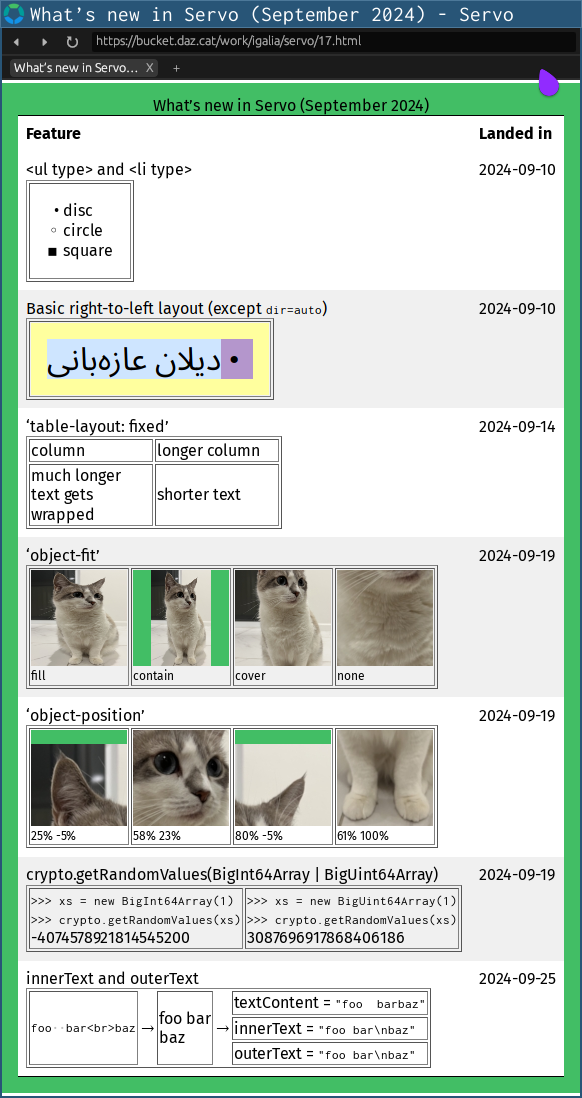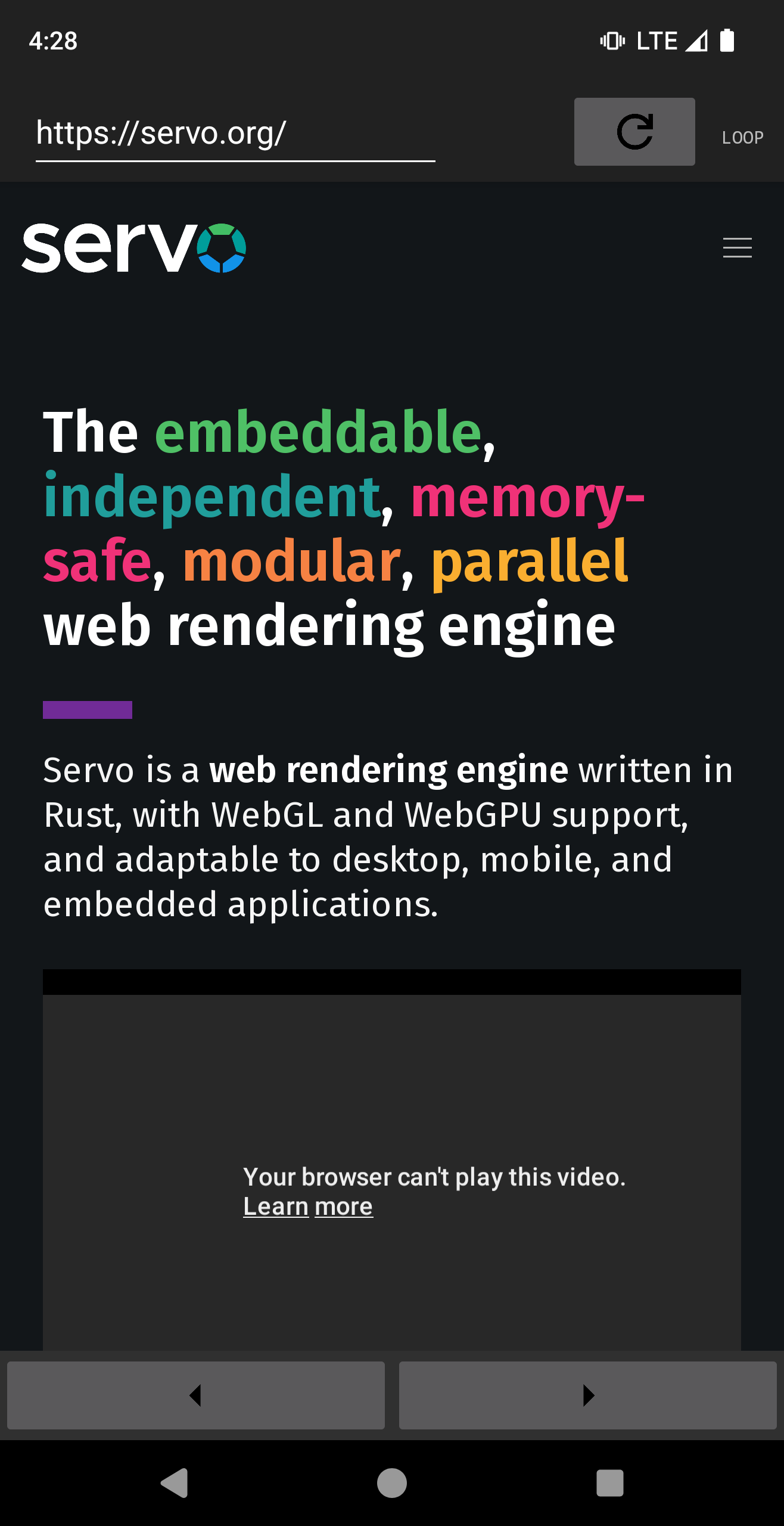Servo has had several new features land in our nightly builds over the last month:
- as of 2024-09-10, we now support <ul type> and <ul compact> (@simonwuelker, #33303)
- as of 2024-09-10, we now support console.timeLog() (@simonwuelker, #33377)
- as of 2024-09-10, we now support the encodeInto() method on TextEncoder (@webbeef, @mrobinson, #33360)
- as of 2024-09-10, we now support <link rel=prefetch> (@simonwuelker, #33345)
- as of 2024-09-12, we now support right-to-left languages, except for floats (@mrobinson, @atbrakhi, #33375)
- as of 2024-09-14, we now support ‘table-layout: fixed’ (@Loirooriol, @mrobinson, #33384, #33442)
- as of 2024-09-17, we now support the ‘reset’ event on XRReferenceSpace properties (@msub2, #33460)
- as of 2024-09-19, we now support the ‘object-fit’ and ‘object-position’ properties (@mrobinson, @Loirooriol, #33479)
- as of 2024-09-19, Crypto.getRandomValues() can now take BigInt64Array or BigUint64Array (@msub2, #33485)
- as of 2024-09-25, we now support ‘innerText’ and ‘outerText’ on HTMLElement (@Melchizedek6809, @shanehandley, #33312)

Servo’s flexbox support continues to mature, with support for ‘align-self: normal’ (@Loirooriol, #33314), plus corrections to cross-axis percent units in descendants (@Loirooriol, @mrobinson, #33242), automatic minimum sizes (@Loirooriol, @mrobinson, #33248, #33256), replaced flex items (@Loirooriol, @mrobinson, #33263), baseline alignment (@mrobinson, @Loirooriol, #33347), and absolute descendants (@mrobinson, @Loirooriol, #33346).
Our table layout has improved, with support for width and height presentational attributes (@Loirooriol, @mrobinson, #33405, #33425), as well as better handling of ‘border-collapse’ (@Loirooriol, #33452) and extra <col> and <colgroup> columns (@Loirooriol, #33451).
We’ve also started working on the intrinsic sizing keywords ‘min-content’, ‘max-content’, ‘fit-content’, and ‘stretch’ (@Loirooriol, @mrobinson, #33492). Before we can support them, though, we needed to land patches to calculate intrinsic sizes, including for percent units (@Loirooriol, @mrobinson, #33204), aspect ratios of replaced elements (@Loirooriol, #33240), column flex containers (@Loirooriol, #33299), and ‘white-space’ (@Loirooriol, #33343).
We’ve also worked on our WebGPU support, with support for pipeline-overridable constants (@sagudev, #33291), and major rework to GPUBuffer (@sagudev, #33154) and our canvas presentation (@sagudev, #33387). As a result, GPUCanvasContext now properly supports (re)configuration and resize on GPUCanvasContext (@sagudev, #33521), presentation is now faster, and both are now more conformant with the spec.
Performance and reliability
Servo now sends font data over shared memory (@mrobinson, @mukilan, #33530), saving a huge amount of time over sending font data over IPC channels.
We now debounce resize events for faster window resizing (@simonwuelker, #33297), limit document title updates (@simonwuelker, #33287), and use DirectWrite kerning info for faster text shaping on Windows (@crbrz, #33123).
Servo has a new kind of experimental profiling support that can send profiling data to Perfetto (on all platforms) and HiTrace (on OpenHarmony) via tracing (@atbrakhi, @delan, #33188, #33301, #33324), and we’ve instrumented Servo with this in several places (@atbrakhi, @delan, #33189, #33417, #33436).
This is in addition to Servo’s existing HTML-trace-based profiling support.
We’ve also added a new profiling Cargo profile that builds Servo with the recommended settings for profiling (@delan, #33432).
For more details on building Servo for profiling, benchmarking, and other perf-related use cases, check out our updated Building Servo chapter (@delan, book#22).
Build times
The first patch towards splitting up our massive script crate has landed (@sagudev, #33169), over ten years since that issue was first opened.
script is the heart of the Servo rendering engine — it contains the HTML event loop plus all of our DOM APIs and their bindings to SpiderMonkey, and the script thread drives the page lifecycle from parsing to style to layout.
script is also a monolith, with over 170 000 lines of hand-written Rust plus another 520 000 lines of generated Rust, and it has long dominated Servo’s build times to the point of being unwieldy, so it’s very exciting to see that we may be able to change this.
Contributors to Servo can now enjoy faster self-hosted CI runners for our Linux builds (@delan, @mrobinson, #33321, #33389), cutting a typical Linux-only build from over half an hour to under 8 minutes, and a typical T-full try job from over an hour to under 42 minutes.
We’ve now started exploring self-hosted macOS runners (@delan, ci-runners#3), and in the meantime we’ve landed several fixes for self-hosted build failures (@delan, @sagudev, #33283, #33308, #33315, #33373, #33471, #33596).


Beyond the engine
You can now download the Servo browser for Android on servo.org (@mukilan, #33435)! servoshell now supports gamepads by default (@msub2, #33466), builds for OpenHarmony (@mukilan, #33295), and has better navigation on Android (@msub2, #33294).
Tabbed browsing on desktop platforms has become a lot more polished, with visible close and new tab buttons (@Melchizedek6809, #33244), key bindings for switching tabs (@Melchizedek6809, #33319), as well as better handling of empty tab titles (@Melchizedek6809, @mrobinson, #33354, #33391) and the location bar (@webbeef, #33316).
We’ve also fixed several HiDPI bugs in servoshell (@mukilan, #33529), as well as keyboard input and scrolling on Windows (@crbrz, @jdm, #33225, #33252).
Donations
Thanks again for your generous support! We are now receiving 4147 USD/month (+34.7% over August) in recurring donations. This includes donations from 12 people on LFX, but we will stop accepting donations there soon — please move your recurring donations to GitHub or Open Collective.
Servo is also on thanks.dev, and already eleven GitHub users that depend on Servo are sponsoring us there. If you use Servo libraries like url, html5ever, selectors, or cssparser, signing up for thanks.dev could be a good way for you (or your employer) to give back to the community.
With this money, we’ve been able to pay for our web hosting and self-hosted CI runners for Windows and Linux builds, and when the time comes, we’ll be able to afford macOS runners, perf bots, and maybe even an Outreachy intern or two! As always, use of these funds will be decided transparently in the Technical Steering Committee. For more details, head to our Sponsorship page.